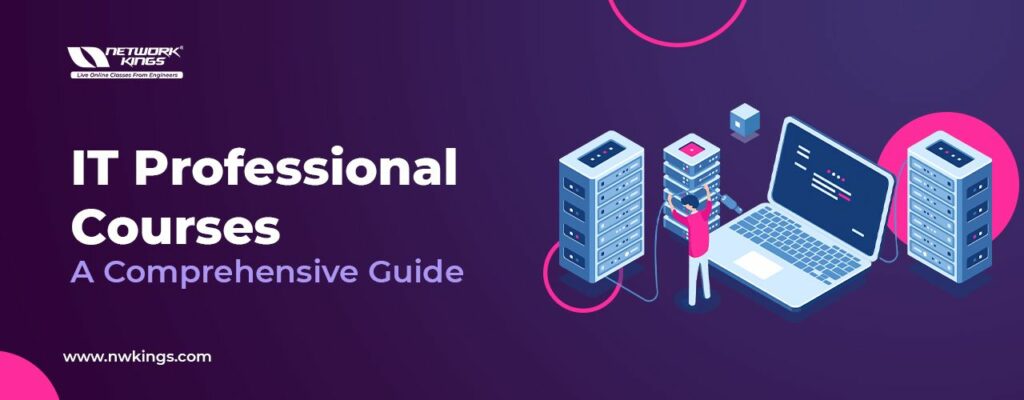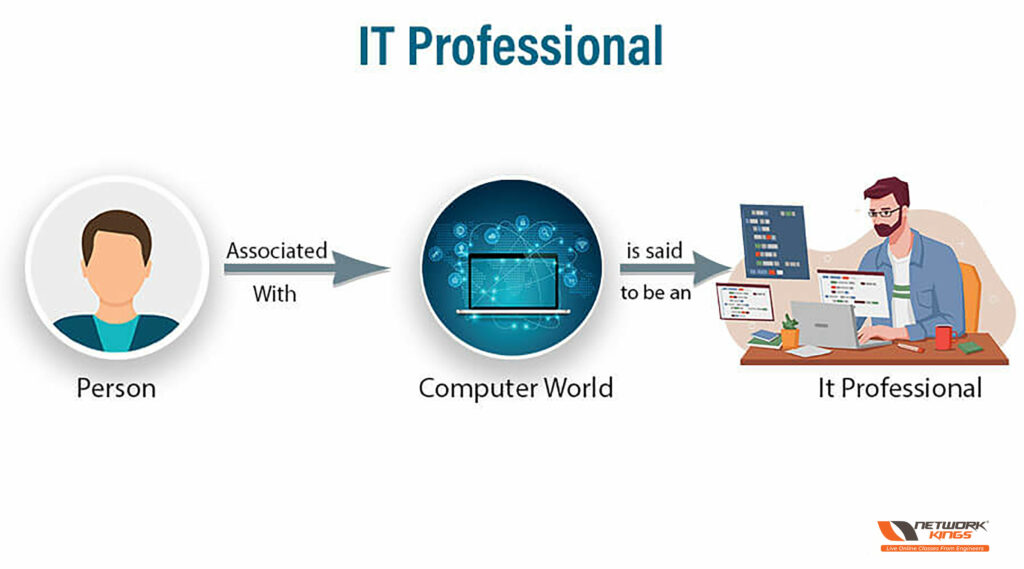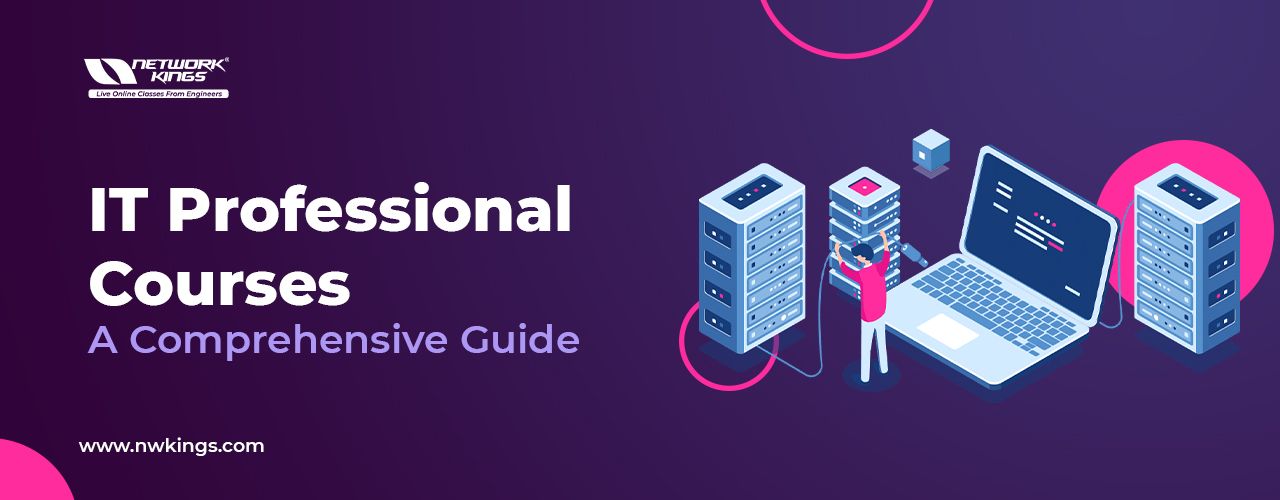
Looking for the best IT Professional courses for a lucrative career in the IT Field? Look no further! In this blog post, we will explore the world of IT professional courses, shedding light on what it takes to become an IT professional, the essential skills required, career objectives, and the best courses to pursue a successful career. We will explore the benefits of undertaking IT professional courses, where to find top-notch online training, the job opportunities that await after completing these courses, and the average salaries of IT professionals in various countries.
What is an IT Professional Course?
IT professional courses are specialized training programs designed to equip individuals with the knowledge, skills, and expertise required to excel in the field of Information Technology. These courses cover a wide range of topics such as programming languages, networking, cybersecurity, cloud computing, and more. An IT professional is someone who has undergone these courses and acquired the necessary competencies to work in various IT roles.
Who is an IT Professional?

An IT professional is an individual who possesses the technical skills and knowledge to design, implement, and manage IT systems and infrastructure. These professionals play a crucial role in ensuring the smooth operation of technology within organizations. They can work in diverse areas such as software development, network administration, cybersecurity, database management, and IT consulting.
What is the role and responsibility of an IT Professional?
The role and responsibilities of an IT professional may include:
- Developing and implementing software applications
- Managing and maintaining computer networks
- Ensuring cybersecurity measures are in place to protect data and systems
- Administering databases and ensuring data integrity
- Project managing IT initiatives
- Designing and developing websites
- Providing IT consulting services to clients or organizations
- Architecting cloud solutions for businesses
- Analyzing data to provide insights for decision-making
- Implementing and managing business intelligence tools
- Securing IT infrastructure and responding to security incidents
- Providing technical support to end-users
- Designing user interfaces and user experiences for applications
- Developing mobile applications
- Managing IT operations and ensuring systems are running smoothly
- Auditing IT systems for compliance and security standards
- Implementing AI and machine learning solutions
- Training staff on IT tools and systems
- Managing IT sales and client relationships
- Collaborating with other IT professionals on projects.
How to Become an IT Professional?
Becoming an IT professional requires a combination of education, practical experience, and continuous learning. Here are the steps to kickstart your journey toward becoming an IT professional:
Get Educated: Pursue a degree in Computer Science, Information Technology, or a related field.
Gain Practical Experience: Internships, part-time jobs, or freelance projects can help you apply theoretical knowledge in real-world scenarios.
Specialize: Choose a specific area of IT that interests you and acquire in-depth knowledge through courses and certifications.
Stay Updated: The tech industry evolves rapidly, so continuous learning through workshops, seminars, and online courses is essential.
NOTE: If you are looking to kickstart your career in IT and become a proficient IT professional, Network Kings’ IT Professional Master Program is an excellent choice. IT Professional Master Program is designed to equip individuals with the skills and knowledge needed to excel in the field of Information Technology.
What are the Top Skills of an IT Professional?
The top skills required for IT professionals include
- Technical Proficiency: Mastery of programming languages, systems, and tools.
- Problem-Solving: Ability to analyze complex issues and devise effective solutions.
- Communication: Clear and concise communication with colleagues and stakeholders.
- Adaptability: Flexibility to navigate changes in technology and business requirements.
- Teamwork: Collaboration with cross-functional teams to achieve common goals.
- Analytical Thinking: Strategic thinking and data-driven decision-making.
- Attention to Detail: Precision in tasks to ensure accuracy and reliability.
What is the Career Objective for an IT Professional?
The career objective for an IT professional is to leverage their technical skills and knowledge to drive innovation, solve complex problems, and contribute to the organization’s success. It involves continually improving one’s skills, staying abreast of industry trends, and aiming for roles that align with one’s career goals.
Best IT Professional Courses for a Successful Career
The top online IT Professional Course List are as follows-
Cloud Computing Courses
Cloud computing courses focus on understanding cloud technologies such as Amazon Web Services (AWS), Microsoft Azure, and Google Cloud Platform. These courses teach how to design, deploy, and manage cloud infrastructure efficiently.
The top Courses in Cloud computing are as follows-
- AWS Solution Architect: This course focuses on designing distributed systems on the AWS platform.
- Azure 104: This course provides an introduction to Microsoft Azure and its core services.
- AZure 500: This course covers the implementation and management of Azure networking.
- Azure 700: This course focuses on implementing solutions on Microsoft Azure.
- GCP Cloud: This course covers the fundamentals of Google Cloud Platform and its services.
- Docker: This course teaches containerization technology using Docker.
- AWS DevOps: This course focuses on implementing DevOps practices on the AWS platform.
DevOps Course
DevOps courses combine development and operations practices to streamline software development processes. Professionals learn automation, continuous integration/continuous deployment (CI/CD), and collaboration techniques.
IT Networking Courses
IT networking courses cover topics like network design, configuration, troubleshooting, Python for Network Engineers, and security. These courses are essential for roles such as network administrator or network engineer.
AWS Certified Solutions Architect Course
This course prepares individuals for the AWS Certified Solutions Architect exam, validating their ability to design scalable, secure, cost-effective cloud solutions using AWS services.
Cybersecurity Courses
Cybersecurity courses focus on protecting organizations’ digital assets from cyber threats. Professionals learn about threat detection, incident response, ethical hacking, and security best practices.
The top courses in Cybersecurity are as follows-
- CEH- Certified ethical hacking: This course focuses on ethical hacking techniques and tools.
- CISSP– Certified Information Systems Security Professional: This course covers information security concepts and practices at an advanced level.
- CompTIA Security+: This course covers foundational cybersecurity skills and knowledge.
- CompTIA Pentest+: This course focuses on penetration testing and vulnerability assessment techniques.
Cisco Certification Courses
Cisco certification courses provide training on networking technologies offered by Cisco Systems. These certifications are highly valued in the industry and can lead to lucrative career opportunities.
Here, are the top Cisco Certifications
- CCNA– Cisco Certified Network Associate: CCNA is an entry-level certification for Network Engineers. This course focuses on the basics of Networking concepts and skills.
- CCNP– Cisco Certified Network Professional: CCNP is an intermediate-level certification for Network Engineers. This course focuses on validating advanced networking knowledge and skills.
- CCNP Data Center: This course focuses on data center technologies like network design, storage networking, and automation.
- Cisco SD-WAN: This course covers Software Defined Wide Area Network concepts and implementation
- OSPF/BGP/MPLS: These are routing protocols used in networking. OSPF (Open Shortest Path First), BGP (Border Gateway Protocol), and MPLS (Multiprotocol Label Switching) are commonly used in enterprise networks.
- CCNP Service Provider: This course concentrates on service provider networking technologies.
- Cisco DevNet: This course focuses on software development for Cisco platforms and APIs.
- CCIE– Cisco Certified Internetwork Expert: CCIE is an expert-level certification course for Network Engineers. This course focuses on providing in-depth knowledge and skills of networking technologies and their implementation at an expert level.
Microsoft Office 365 Course
The Microsoft Office 365 course covers the features and functionalities of the Microsoft Office 365 suite, including SharePoint Online, Teams, Exchange Online, and more. It is beneficial for professionals working with Microsoft cloud services.
MCSA – Microsoft Certified Solutions Associate
MCSA certification validates proficiency in Microsoft products and solutions. It demonstrates expertise in areas like Windows Server, SQL Server, Office 365, or Azure.
NOTE: Join Network Kings’ All Access Pass to access a wide range of top-notch IT professional courses. By enrolling in the All Access Pass, you can gain expertise in various IT domains such as networking, cybersecurity, cloud computing, and DevOps.
What are the Benefits of IT Professional Courses?
Pursuing IT professional courses offers numerous benefits, including
- Enhanced Employability: Improved job prospects, and career opportunities.
- Skill Development: Acquiring specialized skills to excel in diverse IT roles.
- Industry Recognition: Validating expertise through certifications and qualifications.
- Career Advancement: Opening doors to senior roles and leadership positions.
- Networking Opportunities: Building connections within the industry for future collaborations.
- Keeping Pace with Technology: Staying updated with the latest advancements in the IT landscape.
How to Choose the Right IT Professional Course?

In the fast-paced world of technology, selecting the best IT professional course can be a game-changer in shaping your career trajectory. With a plethora of options available, it’s essential to make a well-informed decision that aligns with your interests, goals, and the current demands of the industry. Here are some key factors to consider when choosing the best IT professional course:
Assess Your Interests and Goals
Before diving into the vast array of IT courses, take some time to introspect and identify your interests, strengths, and career goals. Understanding your interests and goals will help narrow down your options and focus on courses that resonate with your passion and vision for the future.
Research Course Content and Curriculum
Once you have a clear idea of your interests and goals, delve into the details of the IT professional courses you are considering. Evaluate the course content, modules, and learning objectives to ensure they align with your expectations. A well-structured curriculum that combines theoretical knowledge with practical application is essential for a holistic learning experience.
Consider Industry Demand and Trends
Stay abreast of the latest trends and developments in the IT industry to gauge the demand for specific skills and technologies. Research emerging technologies in high demand, Skills sought after by employers, and
Job market trends and projections. Choosing an IT professional course that aligns with industry demands increases your employability and opens up opportunities for growth and advancement in your career.
Seek Guidance from Industry Professionals
Networking with industry professionals and seeking advice from mentors can provide valuable insights into the IT landscape. Connect with experienced IT professionals in your network. Take career counseling from a specialized advisors in the tech industry.
Evaluate Training Providers and Accreditation
When selecting an IT professional course, consider the reputation and accreditation of the training provider because enrolling in courses from reputable providers carries more weight in the job market and ensures quality education and training.
Evaluate Cost and Return on Investment
While investing in your education is invaluable, assessing the cost of the IT professional course against the potential return on investment is essential. Balancing the cost of the course with the benefits it offers in terms of career advancement is crucial for making a sound financial decision.
Stay Future-Focused
Technology is ever-evolving, with innovations shaping the future of IT. Choose a course that not only addresses current industry needs but also equips you with skills for future trends. By staying future-focused, you can future-proof your career and stay ahead of the curve in the dynamic IT landscape.
Where to Get the Best Online IT Professional Training?
For top-notch online IT professional training, consider joining Network Kings. With a wide range of courses covering various IT domains, expert trainers, hands-on projects, and certification preparation, Network Kings ensures a comprehensive learning experience that equips you with the skills needed to succeed in the IT industry.
NOTE: If you’re searching for the best online IT professional training, look no further than Network Kings’ IT Professional Master Program. This program is designed to provide top-quality education in various IT domains.
Why choose Network Kings for IT Professional Training?
Choosing Network Kings for IT Professional Course Training offers several compelling advantages that cater to aspirants aiming to excel in the IT field. Here’s a detailed look at why Network Kings stands out as a premier choice:
Expert-Led Training: The courses at Network Kings are conducted by industry professionals who bring real-world experience into the classroom. This ensures that learners are not just getting theoretical knowledge but also insights into how these technologies are applied and function in actual IT environments.
Doubt-Clearance Sessions and Career Guidance: Network Kings provide 1:1 doubt-clearance sessions. This focused approach helps students tackle specific challenges they face during their learning journey. Additionally, they offer career guidance to help learners navigate their career paths effectively after course completion.
24/7 Lab Access: Practical experience is crucial in the IT field, and Network Kings facilitates this by offering 24/7 lab access. This allows learners to practice at their own pace and time, ensuring they can apply what they’ve learned and gain hands-on experience with the technology.
Flexible Learning and Career Growth: With live online classes and access to NWFLIX, their learning platform, Network Kings offers flexibility to learners who might be balancing their studies with professional or personal commitments. This approach ensures that education is accessible and can fit into a variety of schedules.
Job Opportunities Available After IT Professional Courses
Completing IT professional courses opens doors to diverse job opportunities such as:
- Software Developer
- Network Administrator
- Cybersecurity Analyst
- Cloud Architect
- Systems Engineer
- Data Analyst
- IT Consultant
- IT Project Manager
- IT Security Specialist
- IT Support Specialist
- DevOps Engineer
- IT Trainer
- Network Engineer
- Technical Support Engineer
What is the Average Salary of an IT Professional in Different Countries?
The salary of an IT professional varies based on factors like experience, location, skills, and industry demand. On average:
- In the United States: $88,240 per year
- In the United Kingdom: £37,000 per year
- In Australia: AU$82,000 per year
- In India: ₹4,50,000 per year
Wrapping up
In conclusion, pursuing IT professional courses can pave the way for a rewarding career in technology. By honing your skills, staying updated with industry trends, and leveraging online training resources like Network Kings, you can position yourself for success in the dynamic world of Information Technology.










